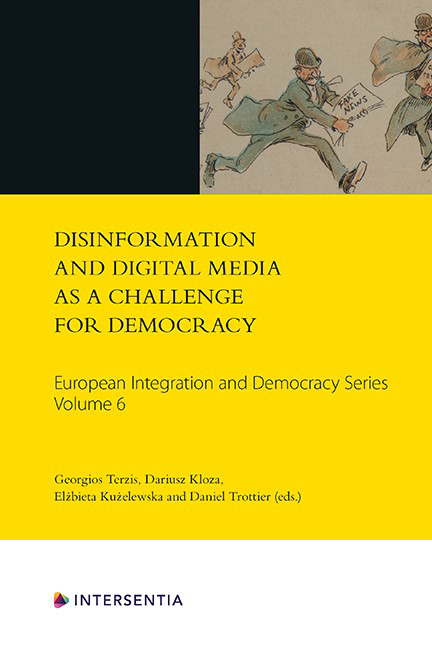Book contents
- Frontmatter
- Foreword: Fooling All of the People All of the Time: Democracy in the Age of Fake News
- Introduction: ‘They All Hear “Ping” at the Same Time’
- Contents
- List of Abbreviations
- List of Contributors
- PART I THEORETICAL APPROACHES TO AND THE CONCEPTUALISATION OF DISINFORMATION
- PART II EXPERIENCE OF DEALING WITH DISINFORMATION
- PART III SOLUTIONS TO DEAL WITH DISINFORMATION AND THEIR CRITIQUE
Introduction: ‘They All Hear “Ping” at the Same Time’
Published online by Cambridge University Press: 26 May 2021
- Frontmatter
- Foreword: Fooling All of the People All of the Time: Democracy in the Age of Fake News
- Introduction: ‘They All Hear “Ping” at the Same Time’
- Contents
- List of Abbreviations
- List of Contributors
- PART I THEORETICAL APPROACHES TO AND THE CONCEPTUALISATION OF DISINFORMATION
- PART II EXPERIENCE OF DEALING WITH DISINFORMATION
- PART III SOLUTIONS TO DEAL WITH DISINFORMATION AND THEIR CRITIQUE
Summary
Most people, in fact, will not take trouble in finding out the truth , but are much more inclined to accept the first story they hear .
– Thucydides, History of the Peloponnesian War (5th century BC)This book is motivated, to a large extent, by some recent troubling developments in public discourse, namely the developments in information and disinformation practices. From the beginning of history, various and diverse means or channels of communication have been used to inform, misinform (unintentionally) and disinform (deliberately). However, in recent decades, the emergence and development of new information and communications technologies (ICT), combined with the ever-increasing digitalisation and globalisation of almost every aspect of modern life, among others, have opened up new and uncharted avenues to that end. This book therefore focuses on disinformation practices occurring with the help of digital media as these practices bring to the fore profound negative ramifications for the functioning of a democratic polity.
In particular, disinformation – nowadays frequently yet not uncontroversially labelled ‘fake news’ , ‘alternative facts’ or ‘post-truth’ in English (and imported therefrom to many other languages), ‘nepnieuws’ in Dutch or ‘infox’ in French – affects the values and principles on which many democratic polities, including the European integration project, have been built, namely democracy sensu largo , the rule of law ( Rechtsstaat ) and the respect for fundamental rights. (This classical ‘constellation of ideals that dominate our political morality’ will be referred to, in this Introduction, simply as ‘democracy’.) Disinformation further affects many other aspects of public life, e.g. political and journalistic practices, all over the world – a development that appears to transcend cultural and political contexts.
From a cursory look at recent history, the 2016 referendum on the departure of the United Kingdom (UK) from the European Union (EU) (the so-called ‘Brexit’ ) and the presidential elections that took place the same year in the United States (US) – and related alleged disinformation practices – have been perhaps the strongest reminder of the importance and the power of disinformation in society, sparking debates in academic, political and artistic circles, and beyond.
- Type
- Chapter
- Information
- Disinformation and Digital Media as a Challenge for Democracy , pp. xiii - xxxviPublisher: IntersentiaPrint publication year: 2020

